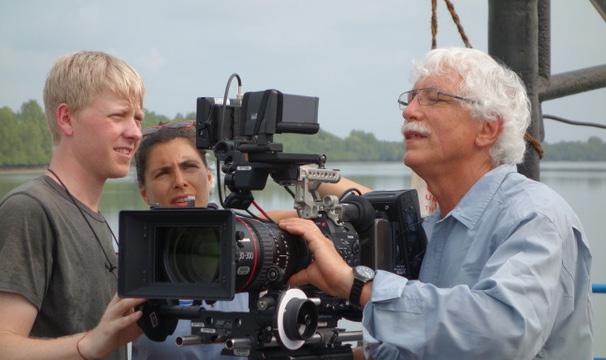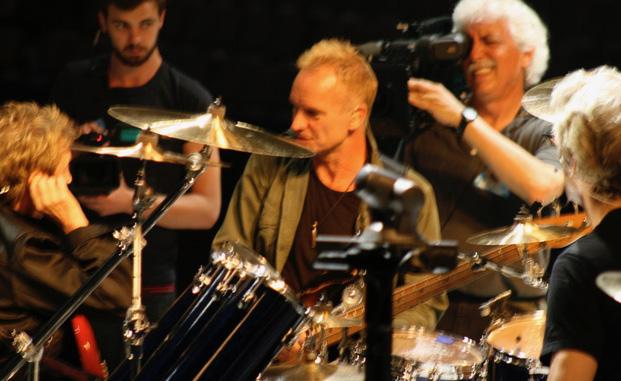
7 minute read
Q & A With Cinematographer Tom Hurwitz, ASC
Q&A WITH CINEMATOGRAPHER TOM HURWITZ, ASC
by Janet Dalton
Advertisement
Tom Hurwitz, ASC is one of America’s most honored documentary cinematographers. Winner of two Emmy Awards, the Sundance and Jerusalem Film Festival Awards for Best Cinematography, Hurwitz has photographed films that have won four academy awards and several more nominations (most recently for "Joan Didion: The Center Will Not Hold," "Dancemaker" and "Killing in the Name").
Manhattan Edit Workshop (MEWShop): Where did you grow up?
Tom Hurwitz, ASC (TH): I grew up in New York City. I did more growing up in New York City than I planned. I went all the way through school in New York City, and then I went to college at Columbia. Over the years, I spent a bunch of time in California, on and off, living there at various times. Also, there were periods of time when I was bi-coastal. That was when I was shooting features and episodic before I decided to specialize in documentary.
MEWShop: How did you get your start?
TH: I graduated Columbia University in the middle of the Vietnam War, right when the country was tearing itself apart. I thought I wanted to do something about that. So, I didn’t go to graduate school, and instead, I became a full-time community organizer for about three or four years in California. I had some connections in New York, so when I started in film I started apprenticing here as a freelancer and I did that for about eight years.
I apprenticed on various kinds of films, features, commercials and documentaries, as an assistant camera person and as a gaffer. I even did sound for a little while so I would get to know what the sound person was thinking.

DP Tom Hurwitz, ASC on Tiger Tiger
In addition to that, I began to shoot documentaries during that time. But most of my effort was in the area of fiction, the traditional route for a young cameraman. After about fifteen years, I was about to move permanently out to L.A., where the main feature work was at the time. We were on the verge of going but in thinking about it, I realized that I wanted to do documentaries because that was really where my heart was. When I went in that direction, I let my income be cut in half and I’ve never regretted it for a second. It was the best choice I ever made, just to specialize in documentary.
MEWShop: Why did you decide to be a cinematographer? Was that something that you always wanted to do?
TH: My father, Leo Hurwitz, was mostly a documentary director and editor. He was shooting a film in 1960 and I got to go with him for a few days and see what he and the DP did. It was clear to me that cinematography was the best job in the world. I already loved photography, and cinematography seemed really fabulous. But, once I got to college it occurred to me that I liked it so much, that there must be something wrong with it – because, how could you like your life’s work that much? So, I decided that I really was supposed to be an English professor not a cinematographer. I majored in English and religion in school. This was fine because when I was going to college, there weren’t many undergraduate film schools. Even though I am totally thankful for my liberal arts education, when I finished college, I realized that I wasn’t supposed to be an English professor.
MEWShop: So, you would advise getting a solid liberal arts education first before film school?
TH: Yes. Everything we do benefits from our ability to understand the world. If our understanding of the world is limited, then our work will be limited.
MEWShop: Why did you switch from shooting scripted films to non-scripted?
TH: I did love shooting fiction and it was a wonderful training in the craft. It’s important for me to connect to the script but many scripts did not connect with me. Some scripts were interesting and challenging, with a very good director and crew, but that was a small minority of the number of jobs I worked on. The rest were just day-to-day design problems - It just didn’t suit my personality. I’m much more interested in the world around me, and in people. I don’t think documentaries are superior to feature films but for me personally, it was the right choice to go back to making documentaries. They just suited me and the way my mind works.
MEWShop: What are some of the qualities in yourself, and in others, that make one suitable to be a documentary cinematographer?

DP Tom Hurwitz, ASC on Can’t Stand Losing You: Surviving the Police
TH: That’s a really good, big question. A documentary cinematographer has to be, first and foremost, a documentarian. They have to have the spirit of documentary. What’s the spirit? Well, that spirit is, really, first of all, that there is grandeur in every human being. It doesn’t just require status or station. A craftsperson – or, even an opioid addict, or a kid in school, or a dancer, or an actor. Everyone has a certain grandeur in them, and with that grandeur comes a story. So, it is seeing stories, and things that are on the top level of human endeavor – all around us. That’s one piece of the documentarian. The other piece is a sense of the importance of some form of social justice. Documentary films have that in their DNA, as crusading works for a just world.
It doesn’t have to be overtly political. Of course, many great documentaries are not at all political. Some of them are just studies on places or events, or even just biographies. There is a spirit behind the best documentaries – that talks about what our best qualities as human beings can be and should be. I think the real documentarians love people and want to see a better world for them.
MEWShop: What skills do you look for in your crew?
TH: The first thing I look for in a crew member is seriousness, and attention. You have to be able to keep focused. It’s just essential. You also have to be serious about learning, and about doing the best possible job. Those are not things that come easily to a lot of people. But they are central to the kind of work we do – because, you can’t hide in a big department in a documentary. We work with very small crews, at very close quarters. If you’re letting your mind wander, or texting when you should be concentrating, it becomes very clear, very quickly.
The second thing is that in this industry part of your job is to keep up to date with everything that’s going on – what is new and to keep abreast of all the technical changes that are happening.
MEWShop: Where do you see the production industry evolving over the next five years?
TH: Oh, my goodness. I have no idea. That level of prognostication, I just can’t do. I do know that I’m really, really happy that I’m not starting out in the industry now. I came up in a time when if you shot film, you were a magician, and nobody knew what was going on between you and the celluloid that was going through the camera. They depended on you to tell them what it was going to look like and to make it right. That was a very special place to be in. It made for a certain amount of anxiety, but it was much better than everybody having an idea about what things should look like and even, now with digital cinema, having the ability to reframe shots from what you originally had envisioned when you were shooting in the moment.

DP Tom Hurwitz, ASC on Cradle of Champions
Now, all of that is really elementary in terms of what’s going to happen, but CGI seems like it is going to become, really, the dominant form of filmmaking. I believe it will become that for at least a certain level of budgets. It may involve using actors made of data. I have no idea what cinematography is going to look like the moment they can change the key light from one side to the other, or all the other things that one can do digitally. Right now, all that often looks a bit phony and often doesn’t work very well. It is especially much better in a documentary to have things actually look real. Goodness knows what’s going to come down the pike. I know that people are working very hard to give as much control as possible to production. The moment we stop being a central part of what we produce as documentarians, we’re just factory labor. Of course, we live in an economic system right now which is directed at making people have as little control over what they do as possible. So, I am very happy that it is not my generation to end up being dependent upon what happens in the next ten or 15 years.
MEWShop: What project are you working on now?
TH: I’m doing a couple of films that have a lot to do with dance, which is a sub-specialty of mine throughout my career. I’m finishing up shooting a film that we’ve been shooting all over the world about dance in praise of God. It’s a wonderful project. I’m working on two films that I’m directing. Another project that involves dance, which is a film about Bill T. Jones who is one of America’s greatest living choreographers and an amazing person. It’s a film about the challenge of art in the face of catastrophe. The other film is about the struggle to integrate New York City’s public school system. n



